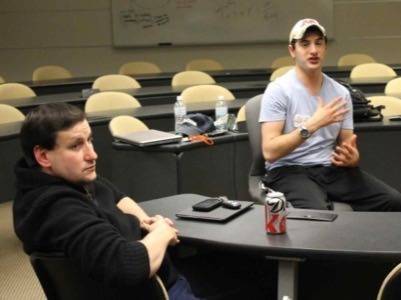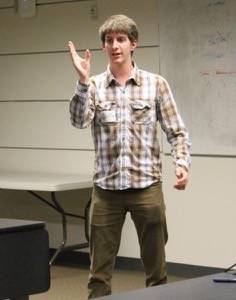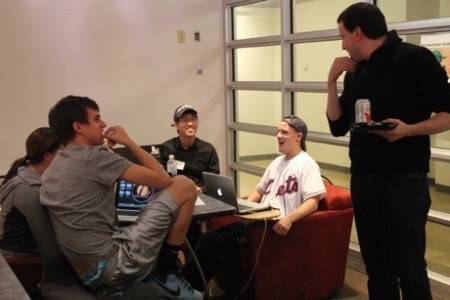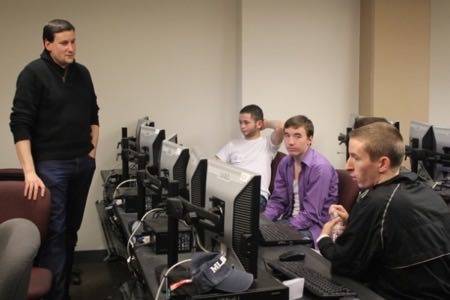Hinds Hall, Syracuse University campus, 1:06 am ET November 11. Team Winston wants to knock this challenge out of the park. MLB.com is expecting these boys to produce a four-minute presentation to a team of VCs (portrayed by MLB.com execs) in about ten hours’ time. They’d started from zero an hour earlier, and they hit upon an idea they feel is nuclear. And they’re acting like it.

“We want to make a game out of the game,” says Ross. Baseball happens maybe a few days per week, but if they could create a kind of “inside sport” whose commodity is a kind of baseball-savvy token (maybe redeemable for swag, maybe not – that idea’s still up in the air at this point), they could change MLB.com from “entertaining” to addictive.

Their idea is, people watching a baseball game (live in the real world or fantasy) could make bets using this virtual currency, on the outcome of certain plays. Will it be a single, a double, a homer? Those who earn points on this system can use it to gain privileges. But those who lose points lose those privileges, so there’s an element of jeopardy involved.

Neil is tossing out ideas. Maybe you could buy real prizes with these tokens! No, let’s not do that, say Ross and Max. It’s one of a long string of strikeouts for Neil, who’d like to get some input. He’s been tired since the beginning of this process, and the frustration is starting to show.
Prof. Jeffrey Rubin has entered the conference room to discuss their ideas so far, and give some positive guidance. Ross is now off the charts, perhaps the cause of earthquakes. “It’ll be addictive, super-duper exciting,” he shouts, suddenly painfully aware of his having invoked the adjective “super-duper.” Resuming his former train of thought, he shouts, “It’ll be like Farmville, where people can’t get out of it! It’ll be like a drug!”

That word hung in the air, and Prof. Rubin considered how he should respond. Having survived “super-duper,” he gave away a little of his poker face; so when “drug” hung in the air like an anvil in a Chuck Jones cartoon, you knew what he was really thinking this time. But he didn’t say it.
Neil made one of the more poignant comments of the morning, though, when he said it would certainly be nice if anyone in the group really knew HTML. They know Photoshop, and that’s maybe good. Maybe.

Prof. Anthony J. Rotolo is a popular social media professor at Syracuse’s iSchool (which is a term used to describe its approach to student access to resources and expertise). The accessibility of the man is encapsulated by one of his more popular courses, which is centered around the Star Trek franchise, and which aims to resolve one of the more pressing issues of our time, Kirk vs. Picard.
“Lean Like a Rotolo” is the name of one of the MLB.com Challenge groups, and if you think this might actually be an oxymoron, it’s not. By midnight, no clear leader had emerged in this group – everybody was working together, and if they were to lean on each other more, you could throw a blanket over them and make a tent. Their idea is to launch a baseball site for kids, with games based around baseball, and perhaps kids’ portals as counterpart to the more adult-oriented video portals MLB.com already has.
One of the group was trying to remember the word “Webkinz,” or else he was trying to pretend for my sake he didn’t know the word. It’s the model he wanted for a Web site where kids buy things, log them in, and get rewards. From there, the group’s thinking about a way to maintain kids’ social profiles. Ever the reminder of the dangers of the real world, Prof. Rubin reminded the Rotolo group about the existence of the COPPA Act, and how it restricts Web sites from collecting certain information about kids. Had the team thought about how this might impact their platform? For a moment, they thought they could mask any signs of them not having thought about it all that much.

Meanwhile, “Rubin’s Army” is made up of four of the professor’s own Information Management and Technologies students. They’ve been batting around concepts by name, if not exactly structure, for the last few hours. After admitting they had been fishing with several different concepts, they settled on some kind of platform where you play a game around the game you’re watching on TV – maybe a trivia game, guess the statistic, something like that. Nothing on a whiteboard, nothing on a screen to show just yet. So far it’s “Rubin’s Army” in name only.

















